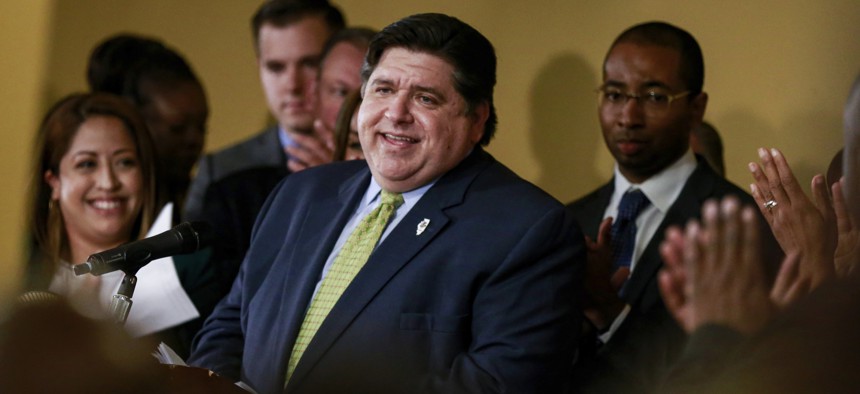Employers Barred from Asking for Job Applicant Wage Histories in More and More States

Illinois Gov. J. B. Pritzker. AP Photo
STATE AND LOCAL ROUNDUP | Putting the city’s light-rail vision to a vote in Phoenix … Looking for a regulatory sweet spot for housing in Des Moines ... Declaring a water emergency in New Jersey.
Democratic Illinois Governor J.B. Pritzker signed a law that will prohibit businesses from asking job applicants or their previous employers about their salary history. New Jersey Lt. Gov. Sheila Oliver signed a similar bill earlier this week, bringing the total number of states that bar applicant salary-data from hiring decisions to at least 18. Illinois lawmakers passed similar proposals previously, but they were vetoed by Pritzker’s predecessor, Republican Bruce Rauner. Supporters of the new law say introducing wage histories into hiring often works to keep women’s salaries lower than men’s salaries, trapping women in a slow-growth cycle in their fields no matter how far up the ladder they might climb. “We are declaring that one’s history should not dictate one’s future, that no person should be held back from earning their true value because of how much money they were paid in a previous job,” Pritzker said. Critics of the proposal say it intrudes too directly into private-sector affairs. They say salary histories improve an employer’s ability to sort through applicants and offer a fair wage. “You get an idea of where they’ve been and how they’ve been building up their career,” Nikki Cimino, a manager in human resources for a Denver nonprofit, told Marketplace. Salary data, she said, helps her avoid wasting time with overqualified applicants. MIT research on the topic found that, without salary data to review, employers tended to hire candidates whose previous salaries were lower than their competitors for the position, suggesting a higher salary history can work as an advantage in landing a job. Massachusetts in 2016 became the first state to bar employers from requesting salary histories before making job offers. Since then, lawmakers have passed similar bills in states that include California, Connecticut, Delaware, Oregon and Vermont. Cities that include New York and Salt Lake have passed their own versions. [Chicago Tribune, New Republic, Marketplace]
LIGHT RAIL | Phoenix voters will decide in an August special election whether to continue or to kill light rail development throughout the metro region. Proposition 105 asks voters to halt the rail project right before the city is set to embark on a $1.3 billion next-phase that includes construction of a downtown hub and more than five miles of new track heading south out of the city center. Phoenix would pay $428 million, the county would pay $280 million, and the federal government would pay $637 million. Supporters of Prop 105 include shop owners along the construction route who fear disruption will cut into business. Opponents, according to 12News, include residents “who see light rail as an important investment that will help Phoenix join the ranks of other major cities with expansive rail systems while lessening the city's reliance on cars.” [12News, AZCentral]
AIR AMBULANCES | The Wyoming Department of Health is proposing a plan that would expand Medicaid as a way to push down the high cost of air ambulance services in the state, reports the Casper Star Tribune. The plan has generated strong opposition and faces significant hurdles before it could take effect. Air ambulances are generally regulated by the federal government. But Wyoming hopes that, by paying for the service at least in part through Medicaid, a federal program, they could win control over where air ambulance companies place their bases and over how much they charge per flight. The state would have to win approval for the plan from the Centers for Medicare and Medicaid Services, and state lawmakers would have to pass changes to state laws. [Casper Star Tribune]
HOUSING | Des Moines, Iowa, is struggling to find a regulatory sweet spot. City leaders have proposed zoning changes meant to streamline an admittedly cumbersome housing development process, but developers oppose the new code, arguing it would create an overpriced market that would halt new construction at a time when the city faces a housing shortage. Proposed requirements include minimum house sizes, single-car garages and full basements. "Any time you add one square foot to a house, it adds [cost]... Nobody will build what the city is proposing if they can't sell it," said Dan Kruse, owner of Kruse Development. City officials say the requirements are meant to protect and boost property values and provide the right mix of housing in the city. [Des Moines Register]
BAD WATER | South River, New Jersey, which lies just Southeast of New Brunswick, declared a water emergency Thursday after residents reported brown foul-smelling water running from their faucets. One described the water as “clayish mud.” The crisis comes in the wake of the arrest in June of the operator of the city’s Water Department, who was accused of falsifying water quality reports and violating the Safe Drinking Water Act. The town has hired water company Agra Environmental to conduct an assessment. "Immediately we’re gonna try to remove the sediment from the system," said Michael Furrey, president of Agra. "We’re looking to improve the treatment first." [WPix; NJ.com]
John Tomasic is a journalist who lives in Seattle.
NEXT STORY: Why Children Born in Big Cities Earn More As Adults





